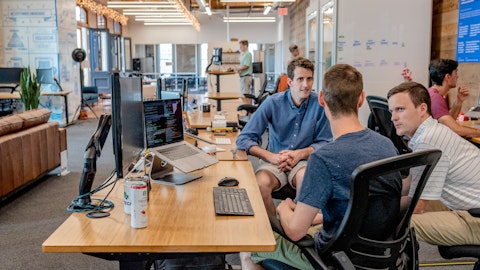Operator: We will take our next question from Smedes Rose with Citi.
Smedes Rose: Hi, thank you. I just wanted to ask a little bit more about the capital spending in 2023. I know you broke out a couple of the line items. Are you thinking any differently about the way that you allocate, I guess, key money, either for conversions or for developers who are considering their brand options? Or anything different there than maybe you’ve done in the past?
Leeny Oberg: Yes. No, Smedes, I thought you might ask this question. So I definitely think it would be helpful to break it down. So if you use, kind of roughly speaking, a midpoint of what I talked about, about $900 million and you take out the renovation projects at the W Union Square and Barbados as well as the $100 million for City Express, you’re down to $650 million. Then you’ve got higher spend on tech systems that will overwhelmingly be reimbursed to us from the system of, call it, another $150 million in €˜23 that’s higher than typical. That then gets you down to $500 million, which is quite similar to this year’s $500 million. I think when you think about key money being, again, in the ballpark of perhaps $200 million, $225 million in €˜23, that actually lines up quite well with our historical kinds of numbers for the growth of the system. And as you know, many, many of the deals that we signed do not require any capital investment on the part of Marriott.
Tony Capuano: And I might just build on that, Smedes, by reminding you of an obvious fact, which is €“ and we’ve shared this in prior Analyst Days. The deals that we determine we may deploy some measure of Marriott capital, even in the form of key money, tend to drive premium valuations and premium fees. And they tend to be much more heavily weighted to our leading luxury portfolio and some of the upper upscale projects as well.
Smedes Rose: Thanks. And can I just follow-up on Robin’s question about City Express or just in general? With your largest, I guess U.S. competitor making a move on what’s being termed, premium economy, do you feel that it’s important for Marriott to also be in that segment in terms of sort of capturing, I guess, a wider range of customers? I mean traditionally, you haven’t really dipped down below, I guess we call it like upper-mid scale. I mean I guess sort of thinking strategically, is that something that you need to be more attentive to or maybe not so much?
Tony Capuano: Yes, I won’t comment on our competitors. What I will tell you is our growth strategy broadly is driven by what we hear from the two constituents that are most directly impacted, obviously, our guests and our owners and franchisees. And what we hear from them loudly and clearly is at the right quality level, entry into mid-scale is of great appeal. An alternative lodging product like Apartments by Marriott Bonvoy is equally appealing to both of those constituents, and that’s where our focus lies right now in terms of expanding the portfolio.
Smedes Rose: Okay. Thank you. Appreciate it.
Tony Capuano: Sure.
Operator: We will take our next question from Patrick Scholes with Truist Securities.
Patrick Scholes: Hi. Good morning everyone.
Tony Capuano: Good morning.
Patrick Scholes: Good morning. First question, I apologize if I missed this. But on your international RevPAR guidance for the first quarter and full year, can you just give us a little more quantification of how you would expect the various international markets to perform regarding €“ or versus those RevPAR ranges you gave, such as Europe and Asia Pacific? Thank you.
Leeny Oberg: Yes. So, broadly, you heard us talk about 47% to 49% for international in the first quarter. And as you think about kind of around the world, I would expect Asia Pacific, both APAC, in particular, outside of China to be meaningfully above that, Greater China, probably somewhere in that ballpark. You clearly saw that EMEA will also be kind of in that very high sort of range. With particularly Europe being a real outlier, very high given where they were a year ago in the first quarter. So, I think the easiest way to think about it is where Omicron was having the greatest impact is where you will see these outsized performances, because for example, a year ago, EMEA, the Middle East was not as impacted by Omicron. So, their year-over-year increase will not be as strong.
I think one of the messages that we want you to hear is that in this current environment, when you think about kind of moving from Q4 into Q1, we are still seeing good opportunities for continued strength and growth in occupancy and rate apart from any normal seasonal variation.
Patrick Scholes: Okay. Thank you. And just a follow-up question, more of an operational issue. There is a bit of a debate out there whether housekeeping will be coming back. I was at Allison, I talked to some of the large managers, and they are at the belief that housekeeping will be coming back eventually on a daily type of service, I am curious what your thoughts are on that amenity? Thank you.
Tony Capuano: Of course, I might repeat myself a little bit in the comment I made earlier about City Express. When we make these sort of operating protocol decisions, we are guided by both the evolving expectations of our guests and the economic realities of our owners and franchisees weighing both of those sets of expectations and needs. What we have said is we will have modified housekeeping protocols by quality tier. So, in our luxury portfolio, we are essentially back to pre-pandemic full daily housekeeping. In the upper upscale tier, we have daily tidy, so not a full cleaning, but making the bed, changing the tearing , cleaning the trash, etcetera. And in our select service, or MSB portfolio, we have every other day tidy.
What we hear from our guests, if you give us optionality, which we do both in the booking path and a check-in. And if you give us something we can count on consistently, you will meet our needs. And this blended approach captures a lot of the economics that we created during the pandemic for our owners and franchisees.
Patrick Scholes: Okay. Thank you for the color.
Tony Capuano: Sure.
Operator: We will take our next question from Dori Kesten with Wells Fargo.
Dori Kesten: Thanks. Good morning Tony and Leeny.
Leeny Oberg: Good morning.
Dori Kesten: You mentioned higher technology costs this year. We have heard that you have some pretty interesting plans on that front that owners are looking forward to. Can you just walk through what the changes are that we may see over the next several years?
Leeny Oberg: I will start and give you the investment perspective, and then I am sure Tony will jump in. So, I guess first, I would say this is not what I would call one thing. This is really a recognition that we view that the digital experience and the experience for our customers and for our associates on the systems that they interact with the company as being of critical importance over the next few years or really forever. And so in that regard, we are very excited about the work that we are doing on our tech systems that really will transform the experience for the mobile app and for our guests as they plan and execute their stays with us. It will also transform the experience for our associates, which is critically important as well as we think about how they take care of our guests, most particularly, as they are able to interact with our Bonvoy guests to really address their specific needs.
So, as we look at rolling it out, you have probably seen our announcements of working with several third-party service providers to really transform several of our systems. But I also think it’s worth noting that we have already done incredible things on our app and the experience from the digital communications and platform with our customers and our ability to really address their specific wants and needs has already improved meaningfully, and we expect to build on that.





